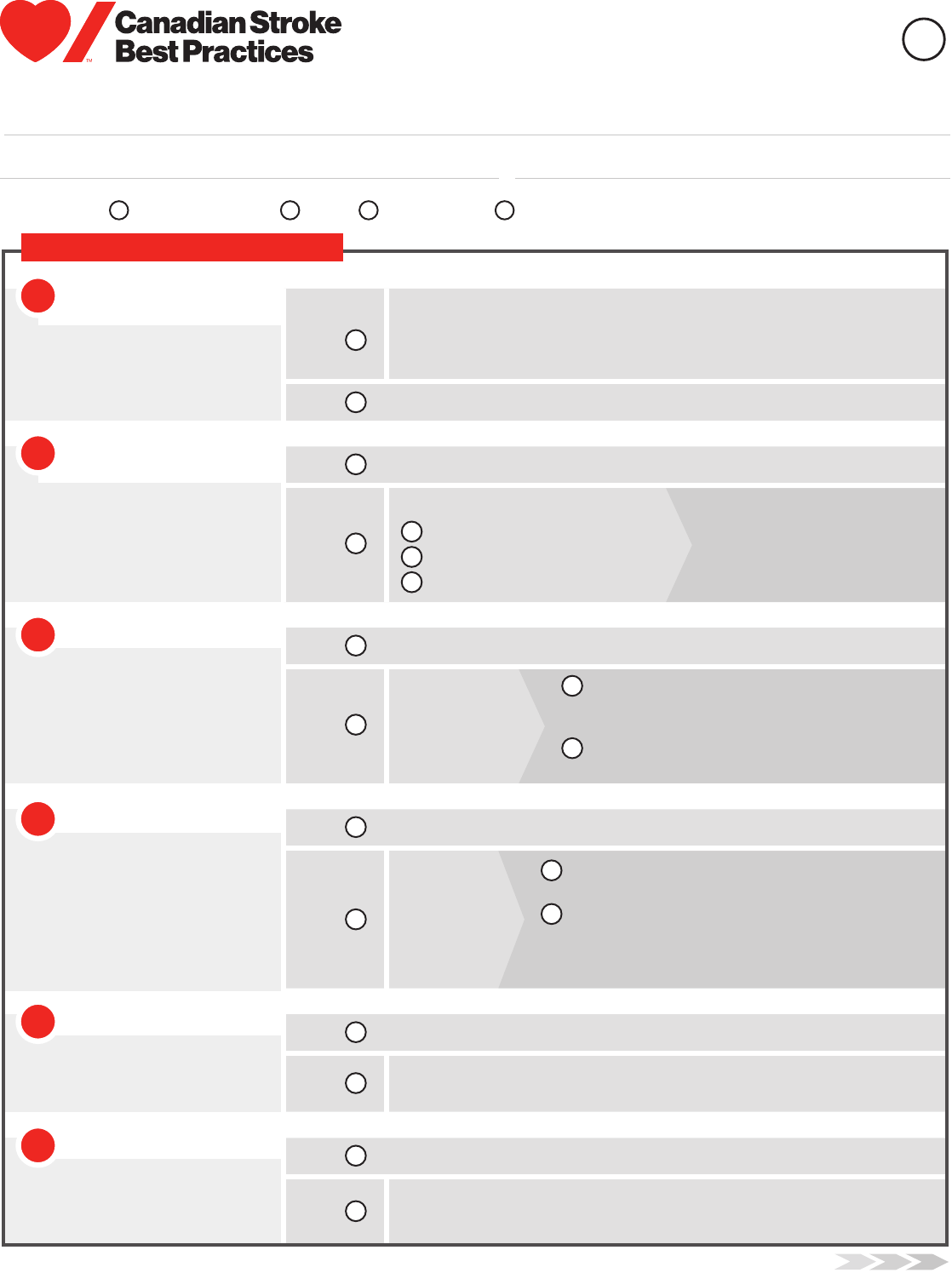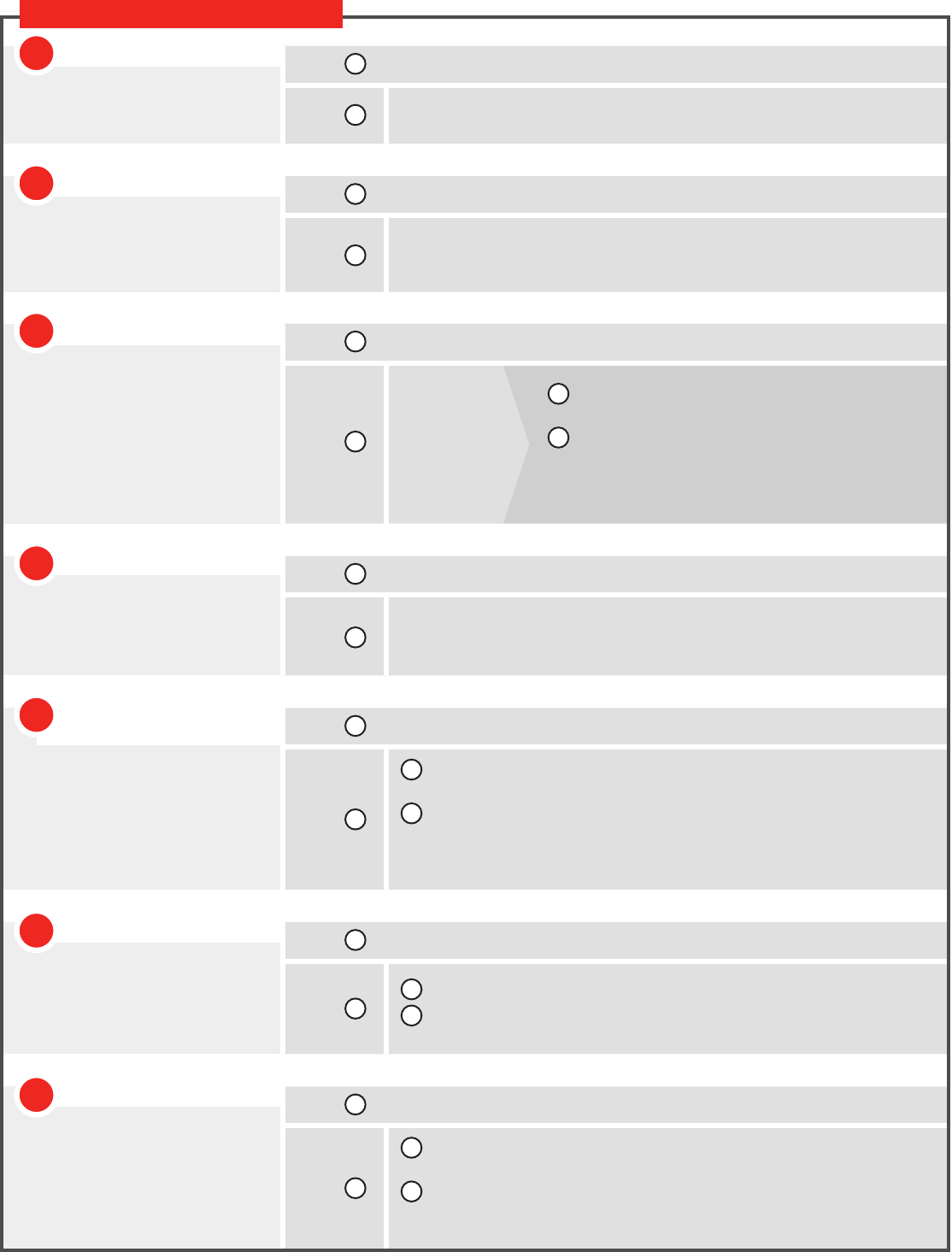
Secondary
Prevention
1
Activities of
Daily Living (ADL)
2
Incontinence
6
Pain
5
Spasticity
4
Have you received medical
advice on health-related lifestyle
changes or medications to
prevent another stroke?
Are you finding it more dicult
to take care of yourself?
Are you finding it more dicult to
walk or move safely (i.e., from bed
to chair)?
Do you have increasing stiness
in your arms, hands, or legs?
Do you have any new pain?
Refer patient to primary care providers for risk factor assessment and
treatment if appropriate, or secondary stroke prevention services.
Do you have diculty:
dressing, washing, or bathing?
preparing hot drinks or meals?
getting outside?
Are you
con tinuing
to receive
rehabilitation
therapy?
Is this
interfering
with activities
of daily living?
Ensure there is adequate evaluation by a healthcare provider with expertise
in pain management.
Continue to monitor progress
Continue to monitor progress
Continue to monitor progress
Continue to monitor progress
Continue to monitor progress
Post-Stroke Checklist
Developed by the Global Stroke Community Advisory Panel (2012), endorsed by the World Stroke Organization, adapted by
the Heart and Stroke Foundation Canadian Stroke Best Practice Recommendations development team (2014)
Completed by: Healthcare Provider Patient Family Member Other
✓
If Ye s to any, consider referral
to home care services;
appropriate therapist;
secon dary stroke prevention
services.
No. Consider referral to home care services;
appropriate therapist; secondary stroke
prevention services.
Ye s . Update patient record; review at next
assessment.
No. Update patient record; review at next
assessment.
Ye s . Consider referral to rehabilitation service;
secondary stroke prevention services;
physician with experience in post-stroke
spasticity (e.g., physiatrist, neurologist).
Patient Name: Date Completed:
YES
YES
YES
YES
YES
NO
NO
NO
NO
NO
Are you having more problems
controlling your bladder or bowels?
Consider referral to healthcare provider with experience in incontinence;
secondary stroke prevention services.
Continue to monitor progress
YES
NO
Mobility
3
™The heart and / Icon on its own and the heart and / Icon followed by another icon or words in English or French are trademarks of the Heart and Stroke Foundation of Canada.
Since Your Stroke or Last Assessment

Continue to monitor progress
Continue to monitor progress
Continue to monitor progress
Continue to monitor progress
Continue to monitor progress
Are you experiencing fatigue that is
interfering with your ability to do
your exercises or other activities?
Life After Stroke
10
Fatigue
12
Other Challenges
13
Communication
7
Are you finding it more dicult
to communicate?
Are you finding it more dicult
to carry out leisure activities,
hobbies, work, or engage in
sexual activity?
Consider referral to speech language pathologist; rehabilitation service;
secondary stroke prevention services.
Discuss fatigue with Primary Care provider.
Consider referral to home care services for education
and counselling.
Consider referral to healthcare provider (e.g., psychologist,
neuropsychologist, psychiatrist) with experience in post-stroke
mood changes; secondary stroke prevention services.
Consider referral to stroke support organization (local/provincial support
group, Heart and Stroke Foundation of Canada Living with Stroke program);
leisure, vocational, or recreational therapist.
Continue to monitor progress
YES
YES
YES
YES
NO
NO
NO
NO
Do you have other challenges
or concerns related to your
stroke that are interfering
with your recovery or
causing you distress?
Is this
interfering
with your
ability to
participate
in activities?
Continue to monitor progress
No. Update patient record; review at
next assessment.
Ye s . Consider referral to healthcare provider with
experience in post-stroke cognition changes;
secondary stroke prevention services;
rehabilitation service; memory clinic.
Schedule next primary care visit with patient and family member(s) to
discuss diculties.
Consider referral to stroke support organization (local/provincial support
group, Heart and Stroke Foundation of Canada); healthcare provider
(e.g., psychologist, counsellor, therapist) with experience in family
relationships and stroke.
Schedule next primary care visit with patient and family member(s) to
discuss challenges and concerns.
Consider referral to healthcare provider; stroke support organization
(local or provincial support group, Heart and Stroke Foundation of
Canada).
YES
YES
YES
NO
NO
NO
Mood
8
Do you feel more anxious
or depressed?
Are you finding it more dicult
to think, concentrate, or
remember things?
Cognition
9
Personal
Relationships
11
Have your personal
relationships (with family,
friends, or others) become
more dicult or strained?
For more information refer to heartandstroke.ca or strokebestpractices.ca
Since Your Stroke or Last Assessment
